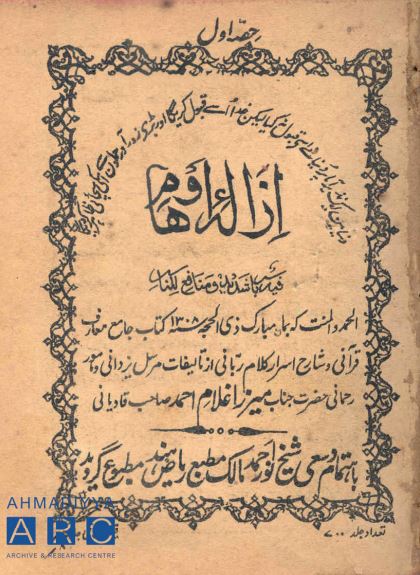Guidance regarding basic Islamic issues – which Hazrat Amirul Momineen, Khalifatul Masih Vaa has given on various occasions in his written correspondence and during MTA programmes – is being officially published below for everyone’s benefit.

Levels of Paradise
Someone wrote to Hazrat Amirul Momineen, Khalifatul Masih Vaa, stating, “Certain non-Ahmadi exegeses [tafasir] refer to the seven ranks of Paradise and their names, although I have not encountered these names in ahadith. The matter in question is whether we, as Ahmadis, believe in these names and if the Promised Messiahas or his Khulafa have offered any guidance regarding this matter.”
Huzoor-e-Anwaraa, in his letter dated 8 December 2022, provided the following answer to this question:
“The various names you have mentioned in your letter, citing verses from the Holy Quran, refer to the different stations and levels of the life hereafter. However, the Holy Quran does not mention a specific number for the total levels of Paradise. Some ahadith do mention the number of levels in Paradise for those who perform various good deeds. For instance, it is recorded in Sahih al-Bukhari that the Holy Prophetsa said:
“‘There are a hundred levels in Paradise, prepared by Allah for those who fight in the path of Allah, and, in between each, is as great a distance as is between earth and heaven.’ (Sahih al-Bukhari, Kitab al-jihadi wa as-siyar, Bab darajati l-mujahidina fi sabilillah)
“Similarly, it is recorded in Sunan Abi Dawud that while explaining the importance of memorising the Holy Quran, the Holy Prophetsa said:
“‘[On the Day of Judgement], it will be said to the one who has memorised the Quran: ‘Recite, ascend and recite slowly and thoughtfully as you recited slowly and thoughtfully when you were in the world, for you will reach your abode when you come to the last verse you recite.’’ (Sunan Abi Dawud, Kitab as-salat, Bab istihbabi t-tartili fi l-qira’ah)
“These ahadith clearly establish that Allah the Exalted has prepared different levels and stations in Paradise for His virtuous servants according to their good deeds, the number and ranks of which are innumerable. For this reason, the Holy Prophetsa utilised the figure ‘one hundred’ to allude to their plentifulness.
“Besides mentioning these stations of Paradise, the ahadith also mention some of the gates of Paradise, each associated with a particular virtue. For instance, it is narrated in Sahih al-Bukhari from Hazrat Abu Hurairahra that the Holy Prophetsa said:
“‘Whoever spends two kinds [of things or property] in the way of Allah will be called [by angels] from the gates of Paradise: ‘O servant of Allah, this is a virtue.’ Whoever was among the people of prayer will be called from the Gate of Prayer, and whoever was among the people of Jihad will be called from the Gate of Jihad, and whoever was among the people of fasting will be called from the Gate of ar-Rayyan, and whoever was among the people of charity will be called from the Gate of Charity.’ Hazrat Abu Bakrra said, ‘May my father and mother be sacrificed for you, O Allah’s Messengersa! There is no [further] need for this for whoever is called from those gates, but will anyone be called from all of those gates?’ He said, ‘Yes, and I hope that you will be one of them.’ (Sahih al-Bukhari, Kitab as-sawm, Bab ar-rayyanu li s-sa’imin)
“In addition to the four gates of Paradise mentioned in this hadith – Bab as-Salat, Bab al-Jihad, Bab ar-Rayyan, and Bab as-Sadaqah – the scholars of Hadith have cited other ahadith to mention four more gates: Bab al-Hajj, Al-Bab al-Ayman, Bab adh-Dhikr or Bab al-‘Ilm, and Bab al-Kazimina l-Ghayza wa l-‘Afina ‘ani n-Nas.
“Ibn Hajar al-‘Asqalani, in his commentary on Sahih al-Bukhari, after discussing these aforementioned gates of Paradise, further writes that it is possible that inside those gates from which one will be called, there are (subsidiary) gates of the actual Paradise, since the number of good deeds exceeds eight.
“Hazrat Musleh-e-Maudra, while expounding Surah al-Hijr where the seven gates of Hell are mentioned, states:
“The mention of seven gates does not necessarily mean that there are only seven gates. For in the parlance of the Arabs, the numbers ‘seven’ and ‘seventy’ are also used idiomatically to express completeness or abundance. Based on this usage, ‘the seven gates of Hell’ implies that there will be an abundance of gates; and for each sin, there will be a separate gate, as Allah the Exalted has said: لِکُلِّ بَابٍ مِّنْہُمْ جُزْءٌ مَّقْسُوْمٌ [‘Each gate has a portion of them allotted to it.’ (Surah al-Hijr, Ch.15: V.45)] Indeed, for Paradise too, the ahadith mention that there will be separate gates for each virtue.’ (Tafsir-e-Kabir, Vol. 4, pp. 81-82)
“The Promised Messiahas himself, while expounding on the gates of Paradise and Hell, states at one instance in his Malfuzat:
“‘For the past few days, in the sermons among the womenfolk, it came up that Hell has seven gates, and Paradise has eight. What is the secret behind it? Instantaneously, it was impressed upon my heart that there are seven foundational principles each for sins and for virtues. The eighth gate of Paradise is the gate of Allah’s grace and mercy.
“‘The seven foundational principles of sin that correspond to the gates of Hell include harbouring ill thoughts. Ill thinking destroys a person, and all false believers have been destroyed by ill thinking. The second principle is arrogance. Those who are arrogant remain apart from the people of truth and do not receive the fortune to acknowledge [truth] like the fortunate ones. The third principle is ignorance, which also leads to destruction. The fourth principle is the pursuit of base desires, followed by the fifth principle of blind imitation.
“‘In short, there are seven core principles of sin or cardinal sins, and all of them are derived from the Holy Quran. Allah Almighty has granted me the knowledge of these gates. Any sin can be traced back to these fundamental categories, with blind imitation and the pursuit of desires encapsulating numerous other transgressions.’ (Malfuzat, Vol. 5, pp. 224-225)
“In summary, Allah the Exalted has prepared gates of entry to Paradise for the virtuous according to their good deeds, and to Hell for the sinful according to their sins; and then in the same way, He has prepared levels and stations in Paradise for the righteous based on their good deeds and in Hell for the wicked based on their evil deeds, a glimpse of which is given in the Holy Quran and ahadith. However, the exact number of these levels and stations is known only to Allah, Whose knowledge encompasses all creation.”
Is FGM allowed in Islam?
A non-Ahmadi woman from Germany sought guidance from Hazrat Amirul Momineen, Khalifatul Masih Vaa regarding female genital mutilation (FGM).
Huzoor-e-Anwaraa, in his letter dated 8 December 2022, provided the following answer to this question:
“Neither the Holy Quran nor the ahadith command female genital mutilation. However, male circumcision is deemed part of the primordial nature [fitrah]. For instance, it is narrated in Sahih al-Bukhari from Hazrat Abu Hurairahra that the Holy Prophetsa said:
الْفِطْرَةُ خَمْسٌ أَوْ خَمْسٌ مِنْ الْفِطْرَةِ الْخِتَانُ وَالِاسْتِحْدَادُ وَنَتْفُ الْإِبْطِ وَتَقْلِيمُ الْأَظْفَارِ وَقَصُّ الشَّارِبِ
“‘Five practices are characteristics from the fitrah: circumcision, shaving the pubic hair, plucking the armpit hair, trimming the nails, and cutting the moustache short.’ (Sahih al-Bukhari, Kitab al-libas, Bab qassi sh-sharib)
“The practice of male circumcision is well-established within the Muslim ummah. In contrast, no continuous practice originating from the era of the Holy Prophet Muhammadsa is found for female circumcision. Regarding the handful of ahadith that do mention female circumcision, scholars of Hadith have critiqued the reliability of certain narrators, labelling some as unknown [majhul] or engaging in tadlis, i.e., being deliberately ambiguous in their transmission, and have categorised these ahadith as weak [da‘if] and interrupted [munqati‘].
“Prior to the advent of Islam, some Arab tribes practised female circumcision, just as it is still practised in some parts of Africa today. However, Islamic sharia has not commanded female circumcision anywhere.
“Proponents of female circumcision often claim it aims to diminish sexual desire. The existence of sexual desire in both men and women is an innate endowment from Allah the Exalted. Islam does not prescribe any directive contrary to nature. Nevertheless, it does offer guidance on how to channel these innate inclinations appropriately. For example, adornment is intrinsic to a woman’s nature. Islam does not forbid adornment; however, it instructs women to adorn themselves for their spouses rather than appearing so in front of non-mahram individuals, to prevent the emergence of societal ills, contrary to Islamic principles.
“If the intent behind circumcision is to entirely eradicate a woman’s sexual desire, thereby reducing her to servitude, this stands in stark opposition to the teachings of Islam. Islam advocates against enslavement and consistently mandates the emancipation of slaves.
“During his Khilafat, Hazrat Umarra once strolled the alleys of Medina at night and overheard a woman lamenting her husband’s absence on the battlefield through heartfelt poetry. Enquiring about her well-being, she disclosed that her husband had been dispatched to war for several months, and her passionate longing for him had become overwhelming. Hazrat Umarra questioned if she harboured any ill intention, to which she swore by Allah’s refuge from such. He reassured her to maintain her composure and dispatched a messenger to summon her husband. Subsequently, he visited Hazrat Hafsahra, expressing a dilemma that had troubled him, and sought her insight on how long a woman could endure without her spouse. Upon hearing this, Hazrat Hafsahra, out of modesty, bowed her head. Hazrat Umarra affirmed, ‘Allah the Exalted does not shy away from the truth,’ prompting Hazrat Hafsahra to indicate with her fingers a period of three to four months. Consequently, Hazrat Umarra issued instructions to his officials not to keep any soldier away from his wife for more than four months. (Musannaf ‘Abd al-Razzaq, Vol. 7, p. 151, Hadith No. 12593; Tarikh al-Khulafa, Jalal al-Din al-Suyuti, Bab Umarra, Fasl fi nubadhin min akhbarihi wa qadayahu)
“If female circumcision eliminated a woman’s sexual desire, and the practice was prevalent among Arabs, then why would this woman have felt the need for physical intimacy with her husband?
“Thus, it is proven that female circumcision was not at all prevalent during the time of the Holy Prophetsa and the Rightly-Guided Caliphs. If it was practised in some region, it was merely a local custom and had no relation to Islamic teachings.”
Are women allowed to go to mixed gyms?
A missionary from the UK asked Hazrat Amirul Momineen, Khalifatul Masih Vaa whether women are allowed to go to mixed gyms when there is not a large crowd.
Huzoor-e-Anwaraa, in his letter dated 8 December 2022, provided the following reply:
“Islam has enjoined both men and women to observe modesty by lowering the gaze and guarding their private parts. However, since men’s duties are mostly outside the home and Islam expresses a preference for women to be more inclined towards domesticity, it also instructs them to exercise greater precaution when going out, as stated in the Holy Quran:
وَلَا يُبۡدِيۡنَ زِيۡنَتَہُنَّ اِلَّا مَا ظَہَرَ مِنۡہَا وَلۡيَضۡرِبۡنَ بِخُمُرِھِنَّ عَلٰي جُيُوۡبِہِنَّ ۔۔۔ وَلَا يَضۡرِبۡنَ بِاَرۡجُلِہِنَّ لِيُعۡلَمَ مَا يُخۡفِيۡنَ مِنۡ زِيۡنَتِہِنَّ
“‘And [they should] not disclose any part of their beauty or their adornments, save that which is apparent thereof. They should draw their head-coverings across their bosoms […] nor should they strike their feet on the ground in such manner as to disclose their ornaments which they ought not to disclose.’ (Surah an-Nur, Ch.24: V.32)
“Therefore, when attendance at mixed gyms becomes unavoidable for women, they are enjoined to closely follow the given directives concerning their dress and demeanour. This involves donning loose and modest attire, inclusive of head coverings, among other requirements. Furthermore, they must avoid mingling with men under these circumstances.”
Can a Muslim pursue a music career?

A missionary from the UK asked Hazrat Amirul Momineen, Khalifatul Masih Vaa whether an Ahmadi Muslim could adopt the profession of a music teacher.
Huzoor-e-Anwaraa, in his letter dated 8 December 2022, provided the following reply:
“An Ahmadi Muslim should adopt a profession that is free from doubtful matters. The Holy Prophetsa has guided us in this regard, saying:
“‘The lawful is clear and the unlawful is also clear, but between them are ambiguous or doubtful matters unknown to many people. Thus, whoever avoids these ambiguities safeguards both his faith and his reputation.’ (Sahih al-Bukhari, Kitab al-iman, Bab fadli mun istabra’a li dinihi)
“Pursuing a career in music is regarded by me as one of the ambiguous matters; hence, it is advisable to steer clear of it. Listening to music or playing instruments at home is a separate issue; adopting it as a profession specifically for the purpose of teaching others can potentially open gateways to numerous undesirable outcomes. This includes the necessity to participate in various events and concerts, which might lead to exposure to various vices. Consequently, opting for an alternative profession is recommended.”
A quote from Izala-e-Auham

A missionary from the UK wrote to Hazrat Amirul Momineen, Khalifatul Masih Vaa, stating, “In his work Izala-e-Auham, the Promised Messiahas discusses a dialogue that took place between the Holy Prophetsa and Hazrat Abu Talib, referring to the entire discourse as divinely inspired. However, this text does not contain the specific proclamation by the Holy Prophetsa stating, ‘Even if they were to place the sun in my right hand and the moon in my left, I would not desist from my mission.’ Clarification on this matter is requested.”
Huzoor-e-Anwaraa, in his letter dated 8 December 2022, provided the following reply:
“In reflecting on the circumstances surrounding Hazrat Abu Talib, it is critical to acknowledge the persistent efforts of Islam’s adversaries to deter the Holy Prophet Muhammadsa from disseminating Islam’s teachings and the divine message. They frequently lodged complaints against him to Hazrat Abu Talib, issuing threats against both Hazrat Abu Talib’s leadership position and the life of the Holy Prophetsa. Moreover, they attempted to seduce the Holy Prophetsa with various worldly enticements. Despite these challenges, the Holy Prophetsa consistently reaffirmed his unwavering commitment, asserting that he could not forsake his divine mission under any circumstances.
“It is possible that these are two separate incidents. The scenario in which the Holy Prophetsa spoke of holding the sun in one hand and the moon in the other might represent one distinct event. The dialogue documented by the Promised Messiahas in Izala-e-Auham might pertain to another unique occurrence, wherein the Holy Prophetsa declared:
“‘That is the very purpose for which I have been sent. If this leads to my death, I gladly accept it. My life is committed to this path. I cannot desist from expressing the truth out of fear of death.’ [Izala-e-Auham, Ruhani Khazain, Vol. 3, pp. 110-112 and footnote]
“There is also a possibility that another narrator might have augmented the part about the sun and moon merely to emphasise the matter, while it may not have been present in the original conversation, which the Promised Messiahas has termed an inspired narration, for a revelation from Allah cannot be erroneous.
“Moreover, considering both statements, the one about having the sun in one hand and the moon in the other somewhat implies an inducement, whereas the statement quoted by the Promised Messiahas expresses the Holy Prophet’ssa willingness to sacrifice his life, which is a far greater level of devotion, for sacrificing one’s life for a cause is no trivial matter.
“In any case, the objective and outcome in both scenarios ultimately converge on the same point: whether my life is at stake or adversaries place the moon in one hand and the sun in the other, I am unwaveringly committed to not abandoning this divine mission.”
(Compiled by Zaheer Ahmad Khan, Head of Records Department, Private Secretariat, London and translated by Al Hakam.)

